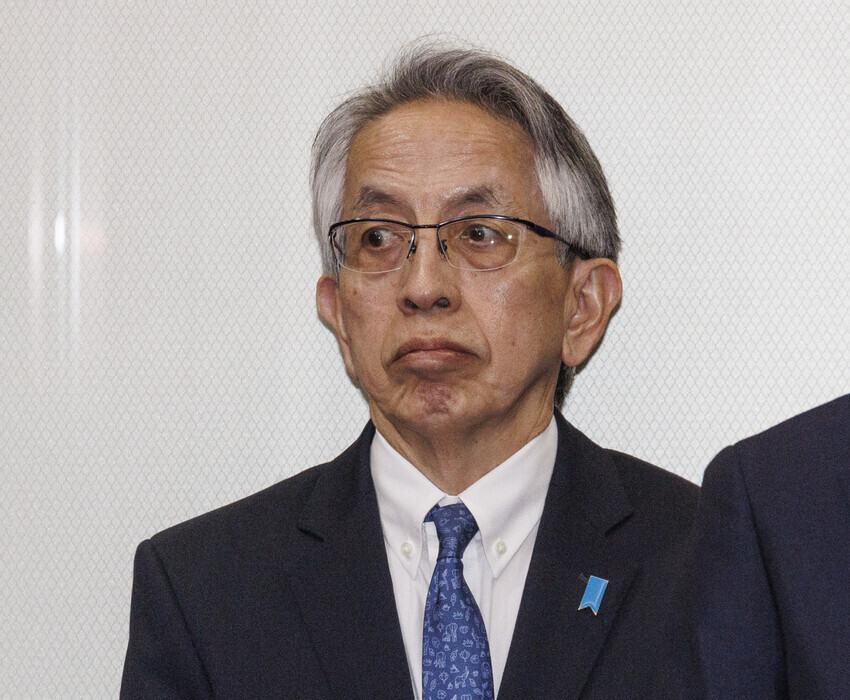hankyoreh
Links to other country sites 다른 나라 사이트 링크
Seoul protests ‘entirely unacceptable’ claims on Dokdo in new Japanese textbooks

The South Korean government expressed deep regret and protest over the Japanese Ministry of Education, Culture, Sports, Science and Technology’s recent approval on Friday of a new textbook for middle school students that distorts historical facts by stating that South Korea illegally occupied the islets of Dokdo and waters down the atrocities committed during Japan’s colonization of South Korea.
First Vice Minister of Foreign Affairs Kim Hong-kyun summoned Japanese Ambassador to South Korea Koichi Aiboshi to formally protest such behavior.
The Ministry of Foreign Affairs issued a spokesperson’s statement on Friday declaring, “The government of the Republic of Korea expresses deep regret over the Japanese government's authorization on March 22 of middle school textbooks containing preposterous claims over Dokdo and other claims that do not conform to historical facts.”
The statement emphasized that Seoul “strongly protests against the fact that the Japanese government once again authorized textbooks containing its preposterous claims over Dokdo, which is clearly an integral part of the ROK territory historically, geographically and under international law. The ROK government makes it clear that Japanese claims over Dokdo are entirely unacceptable.”
Furthermore, it mentioned the ministry’s “strong regret over the alterations made in the expressions and descriptions on the issues of ‘comfort women’ victims of the Imperial Japanese Army as well as forced labor victims during Japanese colonial rule, in a way that does not reveal the coercive nature.”
South Korea’s Ministry of Education also put out a statement.
“When the middle school textbooks in question were initially up for approval in 2020, we requested that corrections be made, since the text trivialized and concealed historical facts such as the forced mobilization of Koreans and the Japanese military’s ‘comfort women’ system. It also contained ungrounded claims to Korea’s sovereign territory, Dokdo, but the corrections we asked for were not reflected in the results of this examination. We strongly protest such behavior and call for immediate amendments.”
The Ministry of Foreign Affairs expressed regret at the Japanese government’s management of the situation, but emphasized the “future-oriented bilateral relationship” between the two countries.
This seems to be in line with the Yoon Suk-yeol administration’s emphasis on improving bilateral relations.
“Building a future-oriented bilateral relationship starts with a correct understanding of history,” the ministry said.
By Park Min-hee, senior staff writer; Park Tae-woo, staff reporter
Please direct questions or comments to [english@hani.co.kr]

Editorial・opinion
![[Column] Season 2 of special prosecutor probe may be coming to Korea soon [Column] Season 2 of special prosecutor probe may be coming to Korea soon](https://flexible.img.hani.co.kr/flexible/normal/500/300/imgdb/original/2024/0426/3317141030699447.jpg) [Column] Season 2 of special prosecutor probe may be coming to Korea soon
[Column] Season 2 of special prosecutor probe may be coming to Korea soon![[Column] Park Geun-hye déjà vu in Yoon Suk-yeol [Column] Park Geun-hye déjà vu in Yoon Suk-yeol](https://flexible.img.hani.co.kr/flexible/normal/500/300/imgdb/original/2024/0424/651713945113788.jpg) [Column] Park Geun-hye déjà vu in Yoon Suk-yeol
[Column] Park Geun-hye déjà vu in Yoon Suk-yeol- [Editorial] New weight of N. Korea’s nuclear threats makes dialogue all the more urgent
- [Guest essay] The real reason Korea’s new right wants to dub Rhee a founding father
- [Column] ‘Choson’: Is it time we start referring to N. Korea in its own terms?
- [Editorial] Japan’s rewriting of history with Korea has gone too far
- [Column] The president’s questionable capacity for dialogue
- [Column] Are chaebol firms just pizza pies for families to divvy up as they please?
- [Column] Has Korea, too, crossed the Rubicon on China?
- [Correspondent’s column] In Japan’s alliance with US, echoes of its past alliances with UK
Most viewed articles
- 1‘We must say no’: Seoul defense chief on Korean, USFK involvement in hypothetical Taiwan crisis
- 2[Editorial] Korea’s surprise Q1 growth requires objective assessment, not blind fanfare
- 3[Column] Season 2 of special prosecutor probe may be coming to Korea soon
- 4Is Japan about to snatch control of Line messenger from Korea’s Naver?
- 5Division commander ordered troops to enter raging flood waters before Marine died, survivor says
- 6No good, very bad game for Korea puts it out of Olympics for first time since 1988
- 7S. Korea “monitoring developments” after report of secret Chinese police station in Seoul
- 8The dream K-drama boyfriend stealing hearts and screens in Japan
- 9[Column] ‘Choson’: Is it time we start referring to N. Korea in its own terms?
- 10Is N. Korea threatening to test nukes in response to possible new US-led sanctions body?